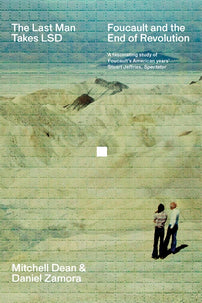I’ve Had Enough With Marx
Foucault’s hostility to the post-war Left is explored in The Last Man Takes LSD by Mitchell Dean and Daniel Zamora.

Foucault’s last decade was marked by an increasing hostility to the post-war Left and its ideas. What Sartre once called ‘the unsurpassable horizon’ of his time was now put on trial. Marxism, and what it represented in intellectual life (a strong state, universal social rights, centralized economy and investment, the idea of revolution, etc.), became a target for Foucault and many other intellectuals. ‘Do not talk to me about Marx any more! I never want to hear anything about that man again . . . Me, I’ve had enough with Marx’, Foucault would respond to a young student in September 1975. With the French publication in 1974 of Aleksandr Solzhenitsyn’s The Gulag Archipelago, and, by the summer of 1975, with rising concerns among the French Left about the radicalization of the Portuguese revolution, the intellectual debate had taken a rabidly anti-Marxist turn. Foucault’s work itself would become more openly anti-Marxist, as his activism slowly shifted away from its Maoist connections towards the struggle for Eastern dissidents.
It is therefore not surprising that, in an unpublished interview in 1977 between Foucault and militants of the French Communist Revolutionary League (LCR), he responded that he ‘wouldn’t mind’ if they described his thought as a ‘war machine against Marxism’. In a 1978 interview entitled ‘How to Get Rid of Marxism’, published in a Japanese journal, he described Marxism as nothing more than ‘a modality of power in an elementary sense’. He then explained that ‘there is one clear determining factor: the fact that Marxism has contributed to and still contributes to the impoverishment of the political imaginary, this is our starting point’. While Foucault scholars are right when they suggest that he was obviously not a Marxist or a supporter of any existing model of revolutionary socialism, they rarely acknowledge that he was not only opposed to Marxism, but also to the ‘political imaginary’ that could be derived from it. The issue was therefore not merely about Marxism as a political doctrine, but, more generally, about its role as a symbol of the political project of the post-war Left. What Foucault and many intellectuals at the time were struggling against was not only socialism abroad, but also a certain kind of socialism and its legacy in France. More fundamentally, after 1968, it is the very notion and entire conceptual structure of revolution that Foucault would reject.
The period in which Foucault’s attacks against Marxism were most violent – between 1975 and 1978 – was, in general, also a moment of intense debate on the relations between totalitarianism and the French Left. During this period, the possibility of a Union of the Left winning elections after its impressive results in 1974 – and the possibility of communists returning to government for the first time since 1947 – worried many post-’68 Left intellectuals. As Foucault’s companion Daniel Defert recalls, it was well known that ‘the leftists did not have a great enthusiasm for the Union of the Left . . . Fantasies of arrests of leftists had even circulated!’ Foucault himself explained to his close friend Claude Mauriac in 1978 that he ‘never had particular sympathy for the Union of the Left’.
Founded in 1972, the Union of the Left united under the ‘Common Programme’ the PCF (French Communist Party), the PS (Socialist Party), and the MRG (Movement of the Radicals of the Left). This ambitious programme proposed the nationalization of the banking system, increases in wages, a reduction of working hours, an expansion of social security, the ‘democratization’ of the workplace, and even the dissolution of NATO and the Warsaw Pact. This alliance, as Marc Lazar writes, marked ‘the victory of those who defended a strong interventionism of the state’ on the Left. The programme – described by the French historian François Furet as ‘the last neo-Bolshevik program of universal history’ – was therefore seen by the coalition as a first step toward socialism.
At the same time, however, the alliance deepened tensions within the Left. Indeed, as Pierre Grémion noted, since May ’68 an important wing of the Union had seen the state ‘as an obstacle rather than a useful tool’ for social transformation. This division was particularly strong within the Socialist Party, where a minority current, called the Second Left (‘la deuxième gauche’), led by Michel Rocard and figures such as Patrick Viveret and Pierre Rosanvallon, defended an anti-statist Left that advocated abandoning any project of radical social transformation. This necessary evolution constituted for them the guarantee of a political thought and project of social transformation that did not carry ‘the totalitarian germ’. From this perspective, these critics played an important role in crafting the more general argument that any triumph of the Common Programme could lead to a ‘totalitarian temptation’ in France.
— Excerpted from The Last Man Takes LSD Foucault and the End of Revolution by Mitchell Dean and Daniel Zamora, now out in paperback!
[book-strip]
